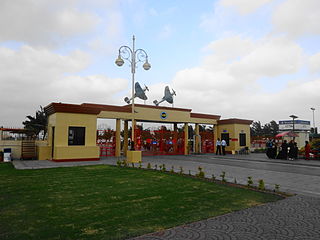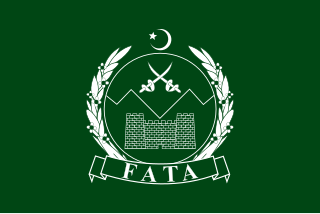
Karachi is the capital city of the Pakistani province of Sindh. It is the largest city in Pakistan and 12th largest in the world, with a population of over 20 million. It is situated at the southern tip of the country along the Arabian Sea coast and formerly served as the country's capital from 1947 to 1959. Ranked as a beta-global city, it is Pakistan's premier industrial and financial centre, with an estimated GDP of over $200 billion (PPP) as of 2021. Karachi is a metropolitan city and is considered Pakistan's most cosmopolitan city, and among the country's most linguistically, ethnically, and religiously diverse regions, as well as one of the country's most progressive and socially liberal cities.

Operation Trident was an offensive operation launched by the Indian Navy on Pakistan's port city of Karachi during the Indo-Pakistani War of 1971. Operation Trident saw the first use of anti-ship missiles in combat in the region. The operation was conducted on the night of 4–5 December and inflicted heavy damage on Pakistani vessels and facilities. While India suffered no losses, Pakistan lost a minesweeper, a destroyer, a cargo vessel carrying ammunition, and fuel storage tanks in Karachi. Another destroyer was also badly damaged and eventually scrapped. India celebrates its Navy Day annually on 4 December to mark this operation. Trident was followed up by Operation Python three days later.

Naimatullah Khan was a Pakistani politician who served as the City Nazim (Mayor) of Karachi from August 2001 to June 2005.
Akhter Hameed Khan was a Pakistani development practitioner and social scientist. He promoted participatory rural development in Pakistan and other developing countries, and widely advocated community participation in development. His particular contribution was the establishment of a comprehensive project for rural development, the Comilla Model (1959). It earned him the Ramon Magsaysay Award from the Philippines and an honorary Doctorate of law from Michigan State University.
The Orangi Pilot Project collectively designates three Pakistani non-governmental organisations working together, having emerged from a socially innovative project carried out in 1980s in the squatter areas of Orangi, Karachi, Pakistan. It was initiated by Akhtar Hameed Khan and implemented by Perween Rahman. Innovative methods were used to provide adequate low cost sanitation, health, housing and microfinance facilities.

Khaliq Dina Hall, also spelled Khaliq Deena Hall, is a library and hall located in Karachi, Pakistan. The building was built in 1906, and was after Ghulam Hoosain Khalikdina - a wealthy merchant and philanthropist who was the main financier for the building, and who wished for Karachi's Muslims to have a space for literary pursuits. It currently has a hall which is used for various events, a library, and a room that serves as the office of a local NGO.

Pakistan Air Force Museum Faisal is the official museum of the Pakistan Air Force located on the south-western edge of PAF Base Faisal near Karsaz Flyover on Shahrah-e-Faisal at Karachi. The museum is the only military aviation museum in Pakistan, with more than 50 aircraft, radars and missiles on display. The museum draws thousands of visitors each day making it one of the most frequently visited tourist attractions in Karachi.

Crime in Pakistan is present in various forms, especially in the cities of Karachi, Lahore, Faisalabad, Rawalpindi, Gujranwala, Peshawar, Multan, Hyderabad, Islamabad and Quetta. Among other general crimes, it includes major crimes such as murder, rape, kidnapping, armed robbery, burglary, carjacking and corruption. For example, in the city of Lahore, 379 murders, 500 attempted murders, 2,650 abductions and 55 rapes have occurred in 2019. A direct relationship has been identified between the crime rate and unemployment rate in Pakistan. Elevated unemployment diminishes the attractiveness of legal endeavors, consequently raising the potential gains from illicit pursuits. As a result, the likelihood of an upsurge in illegal activities rises. Crime statistics of Pakistan shows that there is a rapid increase in the number of crime reported over time like other countries of the world, mainly due to high unemployment, rising poverty, increasing inflation and urbanization. Some other non-economic factors are also responsible for it.
Drinking water supply and sanitation in Pakistan is characterized by some achievements and many challenges. In 2020, 68% Pakistanis, 72% Indians, 54% Bangladeshi had access to the basic sanitation facilities. Despite high population growth the country has increased the share of the population with access to an improved water source from 85% in 1990 to 92% in 2010, although this does not necessarily mean that the water from these sources is safe to drink. The share with access to improved sanitation increased from 27% to 38% during the same period, according to the Joint Monitoring Program for Water Supply and Sanitation. There has also been considerable innovation at the grass-root level, in particular concerning sanitation. The Orangi Pilot Project in Karachi and community-led total sanitation in rural areas are two examples of such innovation.
Americans in Pakistan form a sizeable expatriate community. According to Pakistan's Ministry of Interior, there were 52,486 Americans residing in Pakistan in 2015. Some of them are Pakistani Americans who have returned to Pakistan. Many Pakistani Americans returned during the unstable conditions post-September 11 attacks and the Great Recession.
Karachi Zebras was a Pakistani domestic first-class, List A and T20 cricket team, based in Karachi, Sindh. The team was established in 2006 and its home ground was National Stadium, Karachi.

The Federally Administered Tribal Areas, commonly known as FATA, was a semi-autonomous tribal region in north-western Pakistan that existed from 1947 until being merged with the neighbouring province of Khyber Pakhtunkhwa in 2018 through the Twenty-fifth amendment to the constitution of Pakistan. It consisted of seven tribal agencies (districts) and six frontier regions, and were directly governed by the federal government through a special set of laws called the Frontier Crimes Regulations.

Dawood Ibrahim is an Indian mob boss, drug lord, and terrorist. He reportedly heads the Indian organised crime syndicate D-Company, which he founded in Mumbai in the 1970s. Ibrahim is wanted on charges including murder, extortion, targeted killing, drug trafficking, and terrorism.
Begum Akhtar Riazuddin also spelt Riaz-ud-din or Riaz-ud-deen was a Pakistani feminist activist who was also the first modern Urdu-travelogue writer. She received many awards in recognition of her efforts.
Women's Action Forum (WAF) is a women's rights organization in Pakistan.
Scientology in Pakistan is said to be followed among a very small number of people, mainly from the middle and upper classes of Karachi.
Najma Sadeque from Pakistan was a leading woman journalist, author, human rights activist, particularly of women's rights, an artist, an environmentalist, and a painter. She also did research on socioeconomic issues and authored many books and wrote articles. She co-founded Shirkat Gah in 1975, a women's NGO to highlight human rights violations against women. She also co-founded the Women’s Action Forum (WAF), Pakistan.
Shah Turab ul Haq Qadri was a Sunni Muslim scholar, preacher and politician from Hyderabad who represented the Sufi Barelvi movement in Karachi, Pakistan. He was the main leader of Jamaat Ahle Sunnat, a Sunni organisation in Pakistan.
The Arts Council of Pakistan, Karachi, also known as ACPKHI, is the finest non-profit organization (NPO) in the country today when it comes to performing and fine arts. With state-of-the-art entertainment opportunities available for all segments of society, the Arts Council aims to promote peace and artistic professionalism through various events, theatre, dance, and music academies, literary conferences, creative endeavors, and competitive talent showcases. [1][2]